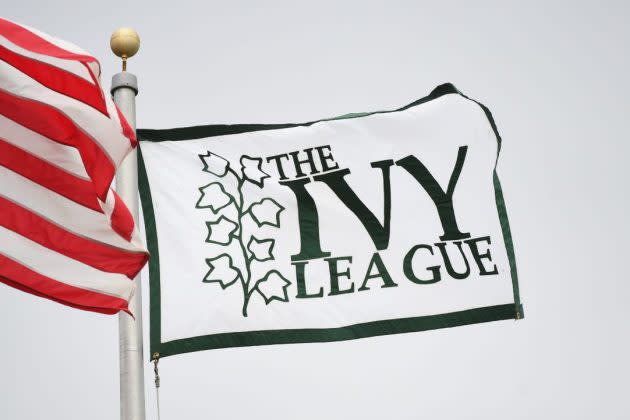Ivy League Asks NLRB to Review and Reverse Dartmouth Union Decision

In a pending amicus brief filed Wednesday, the Ivy League urged the National Labor Relations Board to grant Dartmouth College’s request for review of NLRB Regional Director Laura Sacks’ Feb. 5 decision to recognize the men’s basketball players as employees and order a union vote.
The Ivy League asserts the employment of Dartmouth basketball players would undermine the conference’s academic goals and open the door for “students who participate in club sports, play in a school band or participate in any other of many college extracurricular activities” to also seek employment status.
More from Sportico.com
Reggie Bush's NCAA Lawsuit to Continue Despite Heisman Return
Transgender Athletes Protected by Title IX, Federal Court Rules
Biden's Title IX Rule Lands as NCAA Athletes Gain NIL, Employee Rights
The filing is the latest sign of the far-reaching magnitude of a college basketball team from a New Hampshire town of about 8,000 residents becoming employees and union members.
The Ivy League isn’t a party to Dartmouth’s dispute and needs the NLRB’s permission to submit its brief. The agency is currently deliberating whether to grant Dartmouth’s request for review. As Sportico detailed earlier this month, the Service Employees International Union, Local 560—the labor organization that represents the players—recommends the NLRB deny Dartmouth’s request. There is no guarantee the agency will grant the request, let alone later side with Dartmouth to reverse Sacks’ decision, since the standard to secure a review is high.
The Ivy League and its eight member schools (Brown, Columbia, Cornell, Dartmouth, Harvard, Penn, Princeton and Yale) are no stranger to legal controversy over athlete compensation. They are currently defendants in Choh v. Brown University et al., a lawsuit alleging the Ivy League’s policy of prohibiting athletic scholarships is price fixing and violates antitrust law.
The Ivy League insists Sacks erred when she concluded Dartmouth players are employees, since they perform work for Dartmouth in exchange for compensation and since the school has the right to control that work. The absence of athletic scholarships didn’t dissuade Sacks since the players receive other forms of compensation, including priority admissions to an elite college, per diem payments, expensive sneakers, meals, access to health facilities and other benefits not provided to their classmates.
As the Ivy League sees it, these types of compensation do not establish employment. “The only form of financial assistance” given to Ivy League athletes, the conference contends, “is based solely on need” and not participation in athletics.
To that point, an Ivy League player could matriculate to a member school and then quit the team, but still receive need-based aid and remain a student until they graduate. A counter argument is that such a player might have gained a better deal than a player at another school who has an athletic scholarship, which might be guaranteed for only a year and contingent on playing for a team (among other requirements).
The Ivy League also suggests Sacks’ ruling lacks a limiting principle. If basketball players receiving non-monetary support counts as compensation, then, the conference argues, a school supplying transportation to students in club sports or school band could pave the way for their employment recognition. On the other hand, those students might not receive the same level of benefits, including priority admissions, and they’re likely not under the same degree of institutional control as are varsity athletes.
Another argument leveled by the Ivy League is its assertion the recognition of Dartmouth players as employees would “promote instability in labor relations.” Such recognition could impact other private schools since they are all governed by the National Labor Relations Act. In 2015, the NLRB declined to exercise jurisdiction in a matter involving Northwestern University football players since Northwestern is the only private college in the Big Ten. State laws determine employment matters at public universities and some of those laws are unlikely to recognize college athletes as employees. The Ivy League only has private schools and has other unique features, but the conference nonetheless contends the impact of Dartmouth as employees would extend to other conferences.
The Ivy League also worries employment status would betray the focus of academic excellence at member schools. The conference asserts players might be distracted from schoolwork by having to “carry out their job duties” to earn compensation. The Ivy League also forecasts problems for a union of players since the union would not have authority to bargain over admissions and degree requirements or students’ schedules. Such policies “are fundamental to academic freedom and institutions’ right to make academic decisions.”
“Student employment and academic excellence has never been mutually exclusive – not for students working in dining halls, libraries, or athletic facilities,” SEIU Local 560 president Chris Peck told Sportico. “The same holds true with college athletes. Ivy League schools, no matter how they may wish to position their brands, are not exempt from antitrust and labor laws; amateurism is an invalid defense. Dartmouth has a duty to abide by the law and recognize its basketball players as employees.”
Expect the Dartmouth players to challenge the conference’s assertions. Dartmouth students who work in dining services have formed a union, and it negotiates terms of employment with the school. It does not appear that development has undermined those students’ academic experiences or disrupted core tenets of academic freedom.
Best of Sportico.com
